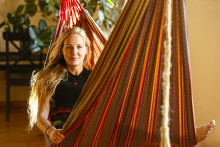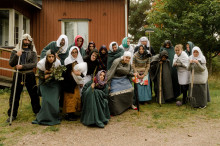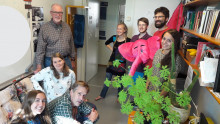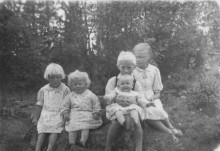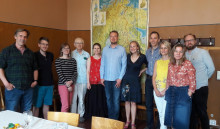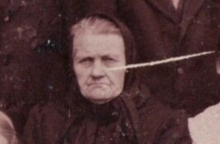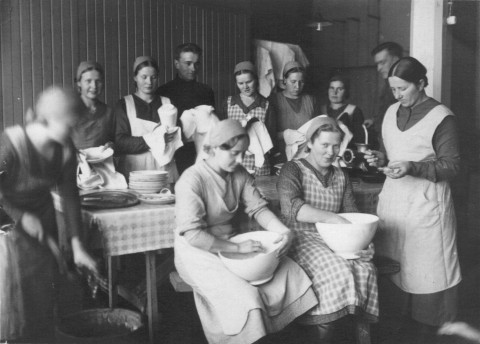
1–2 Postdoctoral Researchers to the NetResilience Consortium |
|
The University of Turku is a world-class multidisciplinary research university which offers interesting challenges and a unique vantage point to national and international research and education. 1–2 Postdoc Researchers to the NetResilience Consortium on social networks, fertility and ageing in humans We invite applications for 1–2 positions of Postdoc / Senior Researchers to the Human Life-History Research Group directed by Professor Virpi Lummaa at the Department of Biology, University of Turku, Finland, for a fixed term period until 30.9.2024 (with an option for extra 3 years). The postdocs are expected to begin their employment 1st of January 2022 or as soon as possible thereafter. The researchers will be part of the consortium “Social networks, fertility and wellbeing in ageing populations: Building demographic resilience in Finland” (NetResilience), funded by the Strategic Research Council of the Academy of Finland. NetResilience investigates how social networks vary between regions and demographic groups and over time, and how they affect fertility, active ageing, individual wellbeing, and demographic resilience. It brings together leading groups of scholars from social science, psychology, ecology, and computer science in Finland, and is directed by professor Antti O. Tanskanen (University of Turku). The postdocs recruited here will work primarily within the lively and international Human Life-History Group (https://human-life-history.science/) at the Biology Department, directed by Professor Virpi Lummaa. Their work within the consortium focuses on (i) quantifying the long-term changes in the structure of family networks in Finland, and provideding knowledge on how these changes are associated with fertility and mortality outcomes over time and during quantifiable hardships such as famines, disease outbreaks and political conflicts (resilience). These key questions will be addressed with longitudinal historical family data gathered from church records and population registers in Finland 1731–2019. Combining them with modern computational tools of network science, we are able to characterise the family network available to each person locally or further away. The main tasks include analyzing these data to identify (T1) Structures of kin networks across the demographic transition in Finland, (T2) Effects of changing network structures on fertility and mortality, and (T3) The type of network structures providing fertility and mortality resilience during hardship. NetResilience is part of the research flagship “INVEST – Inequalities, Interventions and New Welfare State” which aims at providing a new model for the welfare states that is more equal, better targeted to problem groups, more anticipatory as well as economically and socially sustainable. The flagship has been funded by the Academy of Finland and is implemented in cooperation with the University of Turku and the Institute of Health and Welfare (THL). The persons chosen to the positions are expected to participate in research conducted according to the NetResilience research plan and to realise their own research projects related to the topics of NetResilience. Work tasks include some teaching responsibility (5% of the working time at the maximum). The positions include possibilities to work as a visiting researcher in collaborating universities abroad. NetResilience researchers working in University of Turku are also expected to interact and collaborate with the other NetResilience WPs in University of Turku, Population Research Institute (the Family Federation of Finland), University of Helsinki and Aalto University and there is mobility also between the sub-projects. In strategic research consortia, societal interaction has a central role, and NetResilience offers excellent opportunities to gain experience also in societal impact of research. Requirements The persons chosen for the positions are expected to have: a PhD from a relevant field (e.g. anthropology, biology, sociology), strong skills in quantitative methods and experience in using large and complex datasets, the ability to conduct independent scholarly work and publish research on the topics related to the project. Successful applicants have strong research orientation and fluency in English. The eligibility criteria for the positions are defined in the rules of procedure of the University of Turku (Section 38). The persons chosen for the positions are expected to begin their employment in January 2022 or soon thereafter. There will be a trial period of six months. Salary The salary is determined by the collective agreement system of Finnish universities. The position belongs to the category of teaching and research personnel. The pre-estimated salary will be on average 2850–3000 eur/month for a person holding a MSc degree, and on average 3300–4000 eur/month for a person holding a PhD degree. The exact salary will depend on the person’s competence and research experience and will be specified when the employment contract is prepared. Progress in the researcher's personal performance will be taken into account when determining the salary during employment. Working in Finland The university offers comprehensive support and orientation for international recruits. Please learn more about the Finnish culture and people:
Applications The application should include:
The electronic database allows the applicant to submit only one application file to each application section. Information on the file forms to be used can be found in the additional information on each application. Please note that the database only allows the publications to be submitted in a packaged form (.zip). One .zip-file may include several individual files. The University is committed to promoting non-discrimination, equality and diversity in our community. All interested applicants, regardless of their background, are encouraged to apply. Further details are available upon request from Virpi Lummaa, +358 50 4382044, Virpi.Lummaa@utu.fi. Any inquiries about the recruitment process or the e-recruitment system will be answered by HR Specialist Kaisa Ketomäki, kaisa.ketomaki(at)utu.fi. Applications must be submitted by Tuesday 30 November, 2021 (23:59 GMT+02:00 Helsinki) using the electronic application form of the University of Turku on the following address: https://www.utu.fi/en/university/come-work-with-us/open-vacancies. |

